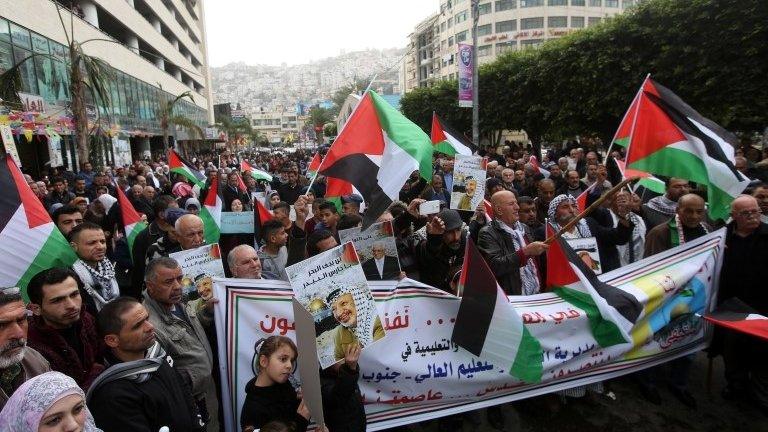Gaza-Israel border: Clashes 'leave 16 Palestinians dead and hundreds injured'
- Published
Clashes took place along Gaza's border with Israel
Palestinian officials say at least 16 people have been killed by Israeli forces and hundreds more wounded during protests at the Gaza-Israeli border.
Thousands had marched to the border at the start of a six-week protest, dubbed the Great March of Return.
The Israeli military said soldiers had opened fire after rioting.
UN Security Council members meeting in New York have called for an investigation into the violence.
Palestinians have pitched five camps near the border for the protest. They are demanding that refugees be allowed to return to homes that are now in Israel.
Palestinian President Mahmoud Abbas urged the UN Security Council to help provide "protection for our Palestinian people".
"I... place full responsibility on the Israeli authorities for the loss of the martyrs who were killed today," he said.
What happened at the border?
The Israel Defense Forces (IDF) said there were about 17,000 Palestinians in five locations near the border fence. It said it had "enforced a closed military zone" in the area surrounding Gaza.
Although most protesters stayed in the encampments, some groups of youths ignored organisers' calls to stay away from the fence and headed closer to Israeli positions.
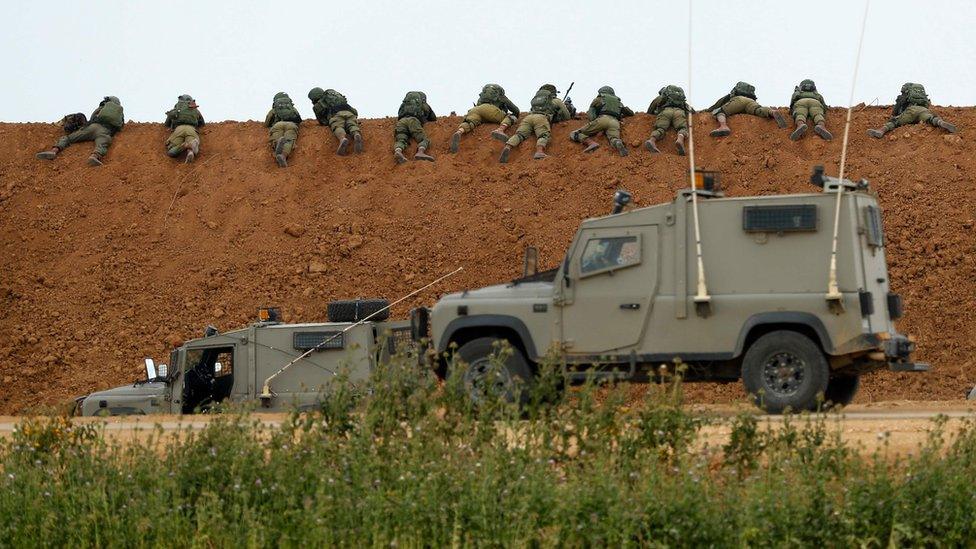
Israeli soldiers maintained a close watch on the border protests
The IDF said troops were "firing towards the main instigators" to break up rioting that included petrol bombs and stones being thrown at the fence.
A spokesman said all those who were killed had been trying to breach or damage the border fence, the Jerusalem Post reports.
Israel said it had targeted sites of the Hamas militant group.
Israel deployed tanks and snipers. Witnesses said a drone had been used in at least one location to drop tear gas.
Will the protests lead to a military escalation?
By Rushdi Abu Alouf, BBC News, Gaza
The death toll from Friday's rally is the largest since the last Israeli war on Gaza in the summer of 2014. Since then Gaza has seen a long period of calm but difficult economic conditions and the Israeli blockade may be the final chapter in the four-year truce between Hamas and Israel.
Despite the call for peaceful demonstrations, the confrontations involving angry Palestinian youths were not surprising. Young men have been demonstrating near the border with Israel on numerous occasions, but this time Israel's response was exaggerated.
Tomorrow, the Palestinians will bury their dead and head back to the border with Israel to throw stones at the soldiers. The important question that remains is to what extent will peaceful demonstrations succeed in stopping an impending war, or will the protests lead to military escalation?

Hamas, the militant group that has controlled the Gaza Strip since 2007, does not recognise Israel's right to exist but last year said it was ready to accept an interim Palestinian state limited to Gaza and the West Bank.
Addressing protesters on Friday, Hamas senior political leader Ismail Haniyeh said "we will not concede a single inch of the land of Palestine".
He said: "There is no alternative to Palestine and no solution except to return."
Palestinian health officials said at least 400 people had been wounded by live ammunition. It said one of those killed was a 16-year-old boy.
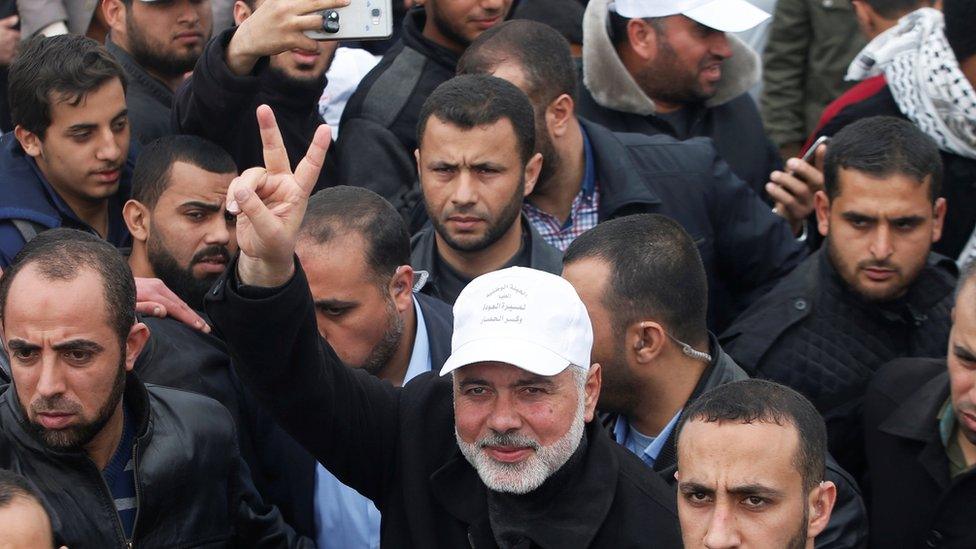
Hamas leader Ismail Haniyeh reiterated that his organisation would not recognise the Israeli state
What have the Israelis said?
The Israeli military oversees a no-go zone along the Gaza border, citing security concerns, and has doubled its troop presence for the protest. It fears the protest could be an attempt at a mass breach of the border.
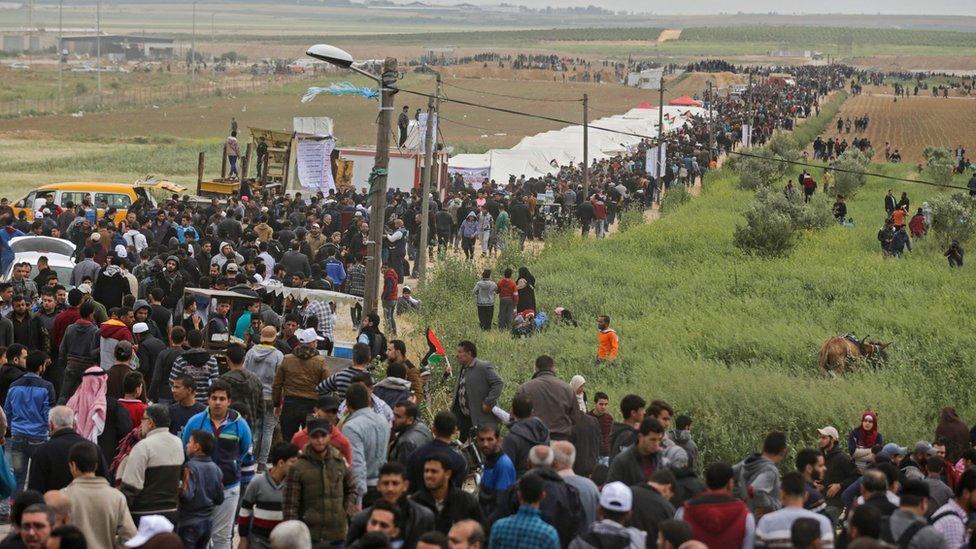
Palestinians march to mark Land Day east of Gaza City
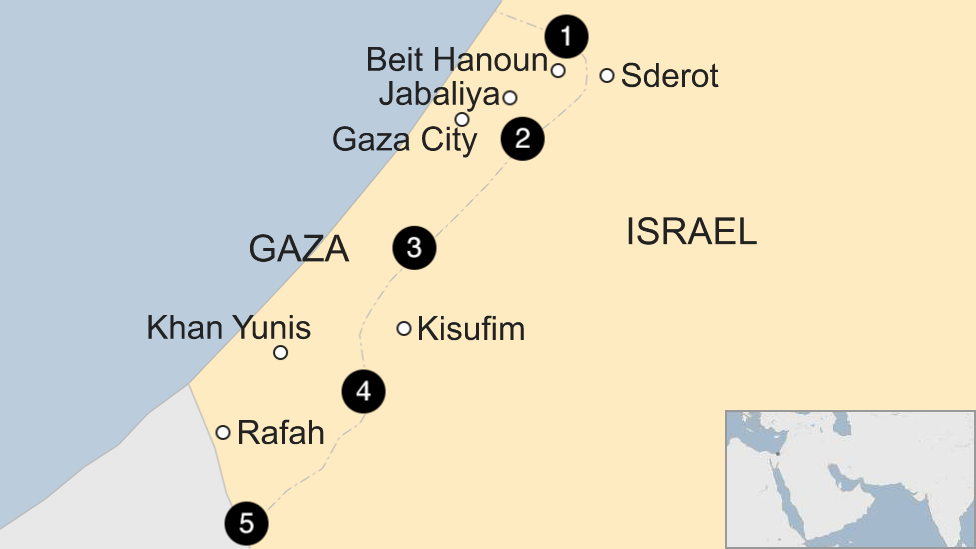
Map showing the position of the five protest camps. Source: Haaretz
The Israeli foreign ministry said the protest was a "deliberate attempt to provoke a confrontation with Israel" and responsibility for any clashes lay "solely with Hamas and other participating Palestinian organisations".
How has the UN Security Council reacted?
UN deputy political affairs chief Taye-Brook Zerihoun told the council the situation in Gaza "might deteriorate in the coming days" and called for civilians, particularly children, to not be targeted, Reuters news agency reports.
"Israel must uphold its responsibilities under international human rights and humanitarian law," he said.
"Lethal force should only be used as a last resort with any resulting fatalities properly investigated by the authorities."
What is the protest about?
Palestinians have erected five main camp areas along the Israel border for the protest, from Beit Hanoun in the north to Rafah near the Egyptian border.
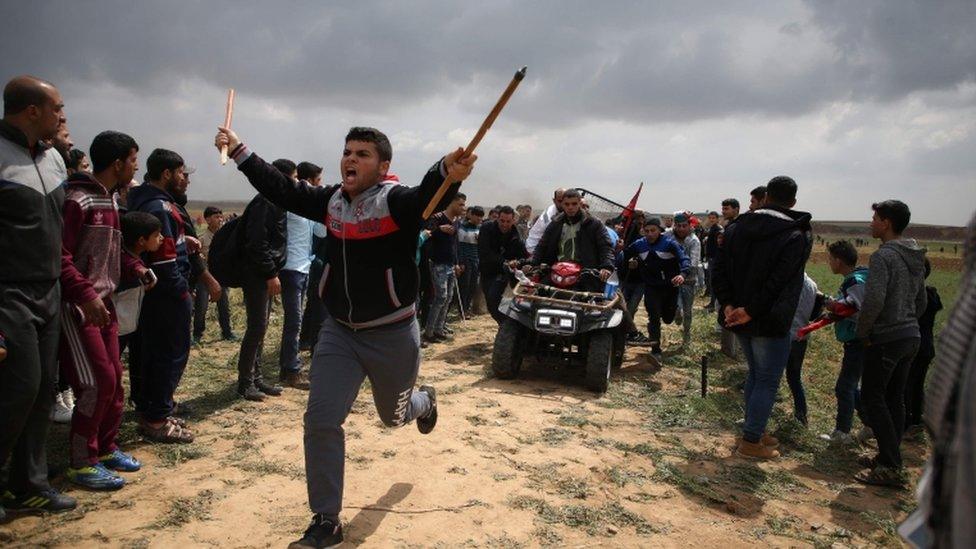
An injured protester is evacuated from Jabaliya
The Great March of Return protests started on Friday as 30 March marks Land Day, which commemorates the killing of six protesters by Israeli security forces during demonstrations over land confiscation in 1976.
The protest is scheduled to end on 15 May, which Palestinians call Nakba (catastrophe) and which marks the displacement of hundreds of thousands of Palestinians during the conflict surrounding the creation of Israel in 1948.
Palestinians have long demanded their right to return but Israel says they should settle in a future Palestinian state in Gaza and the West Bank.
- Published26 June 2023
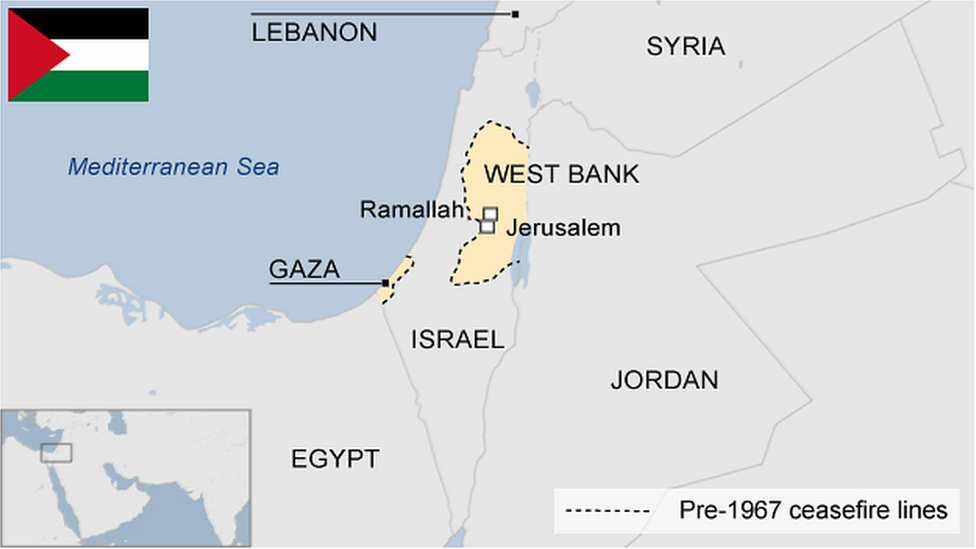
- Published31 March 2018
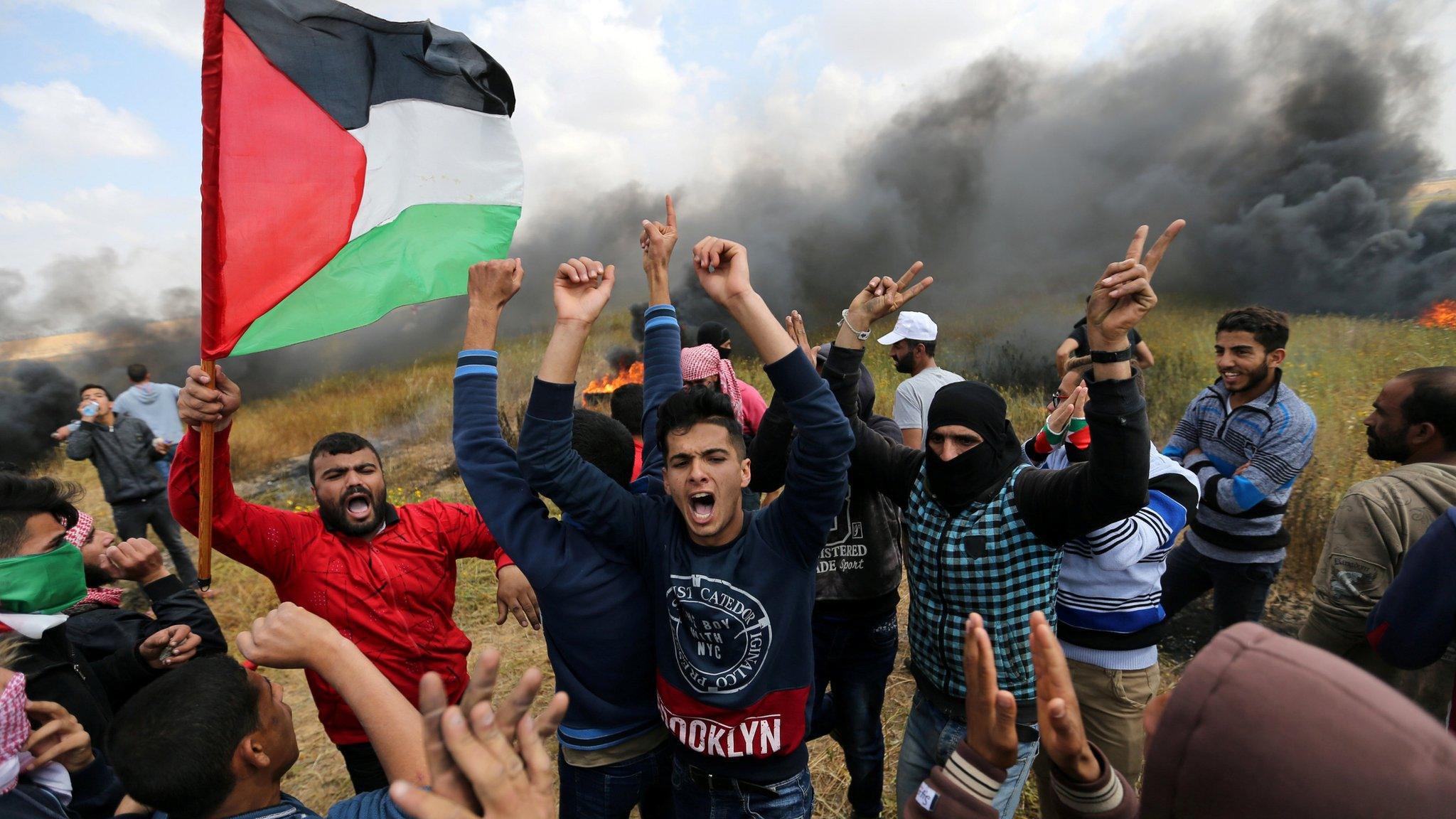
- Published1 July 2021
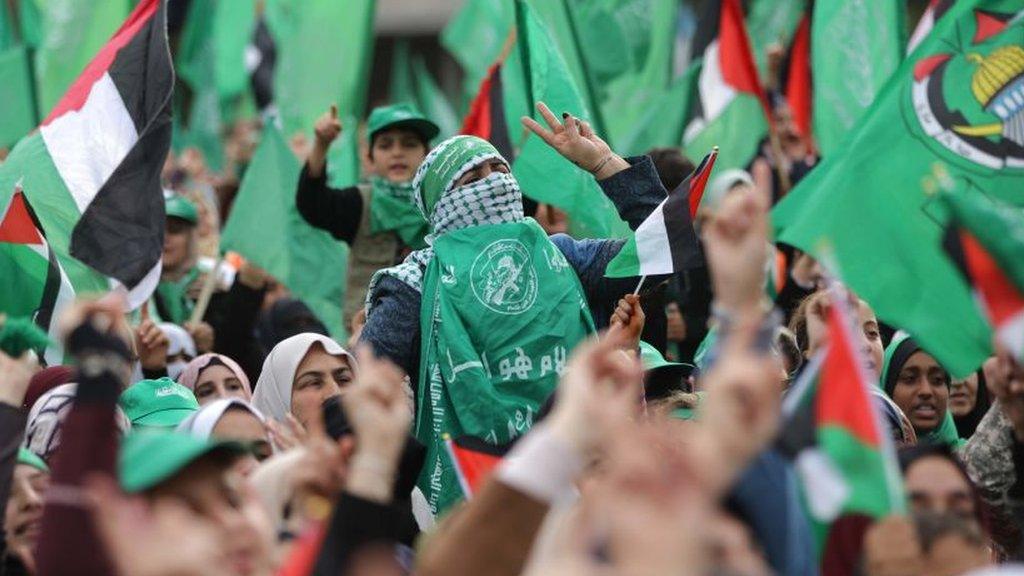
- Published16 September 2021
- Published3 January 2018
